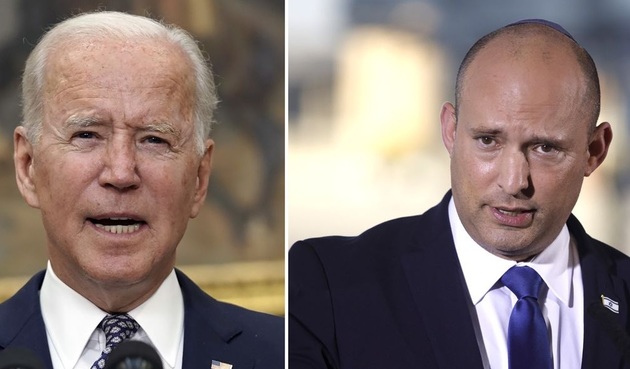Israel's Prime Minister Naftali Bennett hopes to reset relations with the US and agree how to stop Iran's nuclear programme during his first meeting with President Joe Biden at the White House. The right-wing nationalist took office in June after forming an ideologically diverse governing coalition. He succeeded Benjamin Netanyahu, who was close to Donald Trump and clashed with Barack Obama's administration, BBC writes.
Mr Bennett said he was bringing a "new spirit of co-operation" from Israel. He also made clear that Iran would be top of his agenda, especially the "leap" achieved by its nuclear programme over the past two or three years.
Iran has gradually breached its commitments under a nuclear deal with world powers in retaliation for the sanctions that Mr Trump reinstated when he pulled the US out of the accord in 2018, which he called "defective at its core". Iran insists its nuclear activities are peaceful, but it is now enriching uranium to near weapons-grade levels and, according to Israel's defence minister, is only two months away from acquiring the materials necessary for a bomb.
Mr Biden has said he will rejoin the nuclear deal and lift the sanctions if Iran returns to strict compliance. But Iran says he must make the first move. Mr Bennett, who sees the Iranian nuclear programme as a potential threat to Israel's existence, hopes to persuade the president to give up trying to revive the deal.
The prime minister told US Secretary of State Antony Blinken on Wednesday that he hoped their countries could "work together in co-operation and goodwill", and "find common things we do agree upon". They included how to "fend off and curtail Iran's pursuit to dominate the region and its race to a nuclear weapon", he said.
When Mr Trump and Mr Netanyahu were both in office, the US and Israel worked together closely to counter Iran's nuclear activities, its ballistic missile programme and its involvement in conflicts across the Middle East.
However, the New York Times reported on Thursday that Mr Netanyahu curtailed intelligence sharing on Iran with the US in the spring because "he did not trust the Biden administration".
In a separate interview with the newspaper, Mr Bennett said he would present to the president a new strategic vision on Iran that would include forming a regional coalition with "reasonable Arab countries" also opposed to its nuclear programme, as well as continuing "grey-area stuff" - an apparent reference to the covert attacks on nuclear facilities that Iran has blamed on Israel.
A senior US official briefed reporters that Mr Biden would tell Mr Bennett that he shared his concerns about Iran's nuclear activities but remained committed to diplomacy for now. "Since the last administration left the Iran nuclear deal, Iran's nuclear programme has just dramatically broken out of the box," the official said. But if the diplomatic path failed, there were "other avenues to pursue", the official added, without elaborating.






